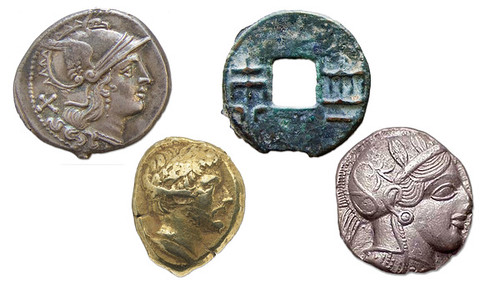
PREV ARTICLE
NEXT ARTICLE
FULL ISSUE
PREV FULL ISSUE
BOOK REVIEW: MONEY CHANGES EVERYTHING
Dave Bowers forwarded this book review from the Financial Times. Thanks! Here's an excerpt. Be sure to read the complete
article online. -Editor
A search on Amazon for the phrase “changed everything” reveals that everything changed everything. Among the book titles claiming that one particular slice of the universe had such an all-pervasive impact are works on — to name a few — Isaac Newton, air conditioning, Jesus, the Apple Macintosh, the Gatling gun, baby boomers and Minecraft. Into this crowded field comes Money Changes Everything (subtitle: How Finance Made Civilization Possible) by Yale University finance professor William Goetzmann. Thankfully, Goetzmann does not appear to be motivated to live up to the hyperbolic title. This is a work of measured claims and meticulous research with a focus on finance as a “co-factor” in the advance of moral and material progress. Societies have long faced a common set of problems, and technology develops to address them. To move things through space we devised wheelbarrows and aeroplanes; to move sound we invented telephony and MP3s. Goetzmann's insight is that finance, too, is a “movement” technology: we sometimes need to move money forwards (for example, to save for retirement) and sometimes backwards (to invest or consume). Like other technologies, finance is sometimes disruptive and has increased in complexity over time. 
Coins, clockwise from top left: Rome (c.210BC); China (3rd century BC); Greece (c.449BC and 322BC) Money Changes Everything is a global history of this technology, with a focus on the ancient near east, classical Greece and Rome, China through the Song dynasty, and medieval and modern Europe. Athenian democracy, the Roman empire, and the “Great Divergence” in which Europe pulled ahead of Asia in the 1700s are but a few examples of developments in which finance played a role in cascading change. Most universities today pay lip service to “interdisciplinary” research but the forces keeping scholars in their silos are strong. True interdisciplinary scholarship is rare partly because it requires the researcher to speak multiple languages with native fluency. If one has grown up speaking economics, one can never speak native sociology, or vice versa. Goetzmann's treatment of financial history is remarkable in its sure-footedness outside his home discipline: he seems equally at home in the modern glass structure of the Yale School of Management and the Yale Babylonia Collection a 10-minute walk away. The reader soon learns how he manages fluency of such breadth: as a young man Goetzmann participated in archaeology digs, studied art history and cavorted with specialists in cuneiform writing — in other words, he grew up multilingual. Money Changes Everything appears to tie together a lifetime of diverse interests. Money Changes Everything is also a tactile and visual history. It is rich with illustrations, and often reported from ground level as Goetzmann travels to dusty European archives or to sites of historical financial significance. The author is at his best when his hands are dirty and there is something to see and touch. It is a pleasure to be in his company as he unfurls the 8-foot long charter of the Bazacle mill company of Toulouse (circa 1372), or describes the archeological remnants of financial panics in the Roman empire. To read the complete article, see:

Wayne Homren, Editor The Numismatic Bibliomania Society is a non-profit organization promoting numismatic literature. See our web site at coinbooks.org. To submit items for publication in The E-Sylum, write to the Editor at this address: whomren@gmail.com To subscribe go to: https://my.binhost.com/lists/listinfo/esylum All Rights Reserved. NBS Home Page Contact the NBS webmaster 
|
